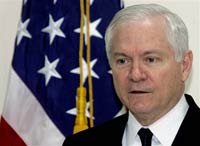Robert Gates to urge Japanese leaders to step up global security efforts
U.S. Defense Secretary Robert Gates, on a two-day visit, wants Japanese leaders to step up their efforts on global security, against the backdrop of a North Korean threat still viewed as serious in the region.

Officials traveling with Gates said Thursday that they expect a great deal of discussion about six-nation talks that led to North Korea's move this week to begin disabling nuclear facilities at its main Yongbyon complex.
The issue was also a hot topic during Gates' meetings earlier this week in South Korea, where Defense Minister Kim Jang-soo declared that he sees no reduction in the threat from North Korea as yet.
In a string of meetings Thursday and Friday, Gates is expected to discuss a broad range of issues, from Tokyo's recent decision to pull warships from their refueling mission in support of U.S.-led coalition operations in Afghanistan to the restructuring of U.S. troops and bases in Japan.
In a speech Friday, Gates is expected to call on Japan, Washington's top ally in Asia, to "take more responsibility in global security matters in keeping with a country of their political, economic and military capacity," said one of the senior officials. They spoke on condition of anonymity because the meetings with Japanese leaders are private.
Senior defense officials stressed that this will not be a lobbying mission by Gates to overturn the Japanese decision on the tankers. But he will have lunch Friday with Japanese officials, including some in the main opposition party who oppose the Afghanistan mission.
The refueling ships were ordered home after the Japanese government failed to hammer out a compromise over the mission with the main opposition party.
The ships provided about 7 percent of the fuel for maritime patrols, and their loss will trigger additional costs and could force ships to refuel on shore, which could put some drain on patrols.
The move is not expected to have a major impact on American operations, but the White House said it would like Japan to reconsider.
Japan also sent ground troops to southern Iraq in 2004-06 to provide humanitarian support following the U.S.-led invasion of that country.
Gates' visit also comes on the heels of a successful ballistic missile test earlier this week above the Pacific Ocean that included the participation of the Japanese navy. The U.S. military shot down two missiles at once, while a Japanese navy Aegis-equipped ship, the Kongo, tracked the missile targets. The Aegis is an integrated radar and missile defense system.
The Kongo also simulated firing its own interceptors in preparation for another test off Hawaii next month in which it will attempt to intercept a missile itself. If successful, the event would mark the first time Japan has ever intercepted a ballistic missile.
Tokyo has poured money into missile defense in the decade since North Korea unexpectedly test-fired a long-range missile over northern Japan in 1998.
Gates is scheduled to meet with Prime Minister Yasuo Fukuda, Defense Minister Shigeru Ishiba and other top government officials during his visit, Japan's Foreign Ministry said.
About 50,000 U.S. troops are based in Japan under a bilateral security treaty. Many Japanese complain of crime, pollution and noise associated with the bases.
Subscribe to Pravda.Ru Telegram channel, Facebook, RSS!




